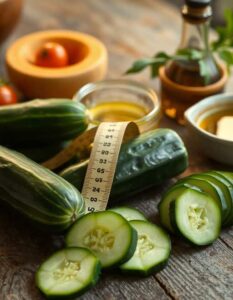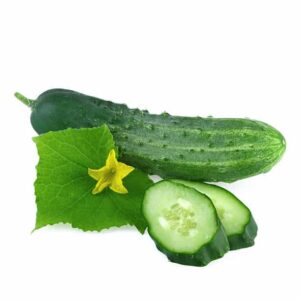Diet plays a crucial role in maintaining optimal health and managing body weight. One popular option for weight loss is the cucumber diet. This diet revolves around consuming a substantial amount of cucumbers and promises quick results. In this article, we will explore the benefits of the cucumber diet and highlight several scientific studies that support its effectiveness.
 How to Follow a Cucumber Diet
How to Follow a Cucumber Diet
The cucumber diet, often touted for its simplicity and low-calorie nature, can be an effective tool for weight loss and detoxification. However, like any diet plan, it’s essential to approach it with a clear strategy and a focus on overall health. This article delves deeper into each step to help you follow the cucumber diet effectively while ensuring you maintain a balanced and healthy lifestyle.
1. Set Clear Goals
Before embarking on the cucumber diet, it’s crucial to define your objectives clearly. Are you looking to lose a specific amount of weight, improve your digestion, or simply reset your eating habits? Understanding your goals will help you stay motivated and on track.
Determine the Duration: The cucumber diet is often followed for short periods, typically ranging from 3 to 14 days. Decide on a timeframe that aligns with your goals. For example, a 3-day plan might be suitable for a quick detox, while a 7-14 day plan could support more substantial weight loss.
Set Realistic Expectations: Understand that while the cucumber diet can lead to rapid weight loss, much of the initial loss might be water weight. Long-term, sustainable weight loss requires consistent healthy eating and lifestyle changes beyond the diet.
Plan Ahead: Preparing for the diet in advance can increase your chances of success. Stock up on cucumbers and other approved foods, and create a meal plan to avoid the temptation of unhealthy choices.
2. Include Cucumbers in Every Meal
Cucumbers should be the star of your diet, but that doesn’t mean your meals have to be boring or repetitive. Cucumbers are incredibly versatile and can be incorporated into a variety of dishes.
Breakfast: Start your day with a refreshing cucumber smoothie. Blend cucumbers with Greek yogurt, spinach, and a touch of lemon for a nutrient-packed breakfast.
Lunch: Create a hearty cucumber salad by combining sliced cucumbers with tomatoes, onions, and a light vinaigrette. Add some lean protein like grilled chicken or tofu for a more satisfying meal.
Snacks: Cucumbers make an excellent low-calorie snack. Pair cucumber slices with hummus or cottage cheese for added protein and flavor.
Dinner: Use cucumbers as a side dish or in more creative ways, such as cucumber noodles (zoodles) topped with a light sauce and lean protein.
Hydration: Cucumber water can be a refreshing drink to accompany your meals, infusing water with cucumber slices, mint, and lemon.
 3. Balance Your Diet
3. Balance Your Diet
While cucumbers are low in calories and rich in water, they don’t provide all the nutrients your body needs. It’s essential to incorporate a variety of other foods to ensure a balanced diet.
Proteins: Lean proteins such as chicken, turkey, fish, tofu, and legumes are vital for muscle maintenance and overall health. Include a source of protein in every meal to stay full and prevent muscle loss.
Whole Grains: While the cucumber diet is generally low in carbohydrates, small portions of whole grains like quinoa, brown rice, or oats can provide sustained energy and essential nutrients like fiber, vitamins, and minerals.
Fruits and Other Vegetables: In addition to cucumbers, incorporate a variety of other vegetables and fruits for a well-rounded diet. Leafy greens, berries, and colorful vegetables can provide antioxidants, vitamins, and fiber.
Healthy Fats: Don’t neglect healthy fats, as they are essential for brain function and hormone production. Include sources like avocados, nuts, seeds, and olive oil in your meals.
4. Stay Hydrated
Cucumbers are about 95% water, making them excellent for hydration, but they shouldn’t replace your daily water intake. Staying properly hydrated is key to overall health, digestion, and even weight loss.
Water Intake: Aim to drink at least 8 glasses (64 ounces) of water daily. You can track your water intake using an app or by carrying a reusable water bottle with you throughout the day.
Herbal Teas and Infused Water: If plain water becomes monotonous, try herbal teas or infuse your water with cucumber slices, mint, lemon, or berries for added flavor without extra calories.
Monitor Hydration: Check your hydration levels by paying attention to the color of your urine. A light, pale yellow color typically indicates proper hydration, while darker urine suggests you need more water.
 5. Practice Portion Control
5. Practice Portion Control
While cucumbers are low in calories, it’s still important to practice portion control, especially with other foods you consume on the diet.
Mindful Eating: Pay attention to your portions by serving food on smaller plates and avoiding distractions like TV while eating. This can help you tune in to your body’s hunger and fullness signals.
Balance Calories: While cucumbers can make up a large portion of your meals, ensure that your overall caloric intake aligns with your goals. Eating too many high-calorie foods alongside cucumbers can hinder weight loss progress.
Snack Wisely: Even though cucumbers are low-calorie, be mindful of what you pair them with. Choose nutrient-dense, low-calorie options like low-fat yogurt, nuts in moderation, or cottage cheese.
6. Listen to Your Body
Being attuned to your body’s signals is essential for long-term success with any diet, including the cucumber diet.
Hunger Cues: Eat when you’re hungry and stop when you’re full. Avoid eating out of boredom or stress, and practice mindful eating by savoring each bite and chewing slowly.
Fullness Cues: On the cucumber diet, you’ll likely feel full faster due to the high water content. Be mindful not to overeat just because cucumbers are low in calories.
Energy Levels: Pay attention to how you feel throughout the day. If you notice a drop in energy or persistent hunger, it may be a sign that you need to incorporate more nutrient-dense foods into your diet.
 7. Incorporate Physical Activity
7. Incorporate Physical Activity
While the cucumber diet can help you lose weight, combining it with regular physical activity can enhance your results and improve overall health.
Cardio Exercises: Engage in moderate-intensity activities like walking, jogging, swimming, or cycling. Aim for at least 150 minutes of cardio exercise per week, as recommended by health experts.
Strength Training: Incorporate strength training exercises like lifting weights or doing bodyweight exercises (e.g., squats, push-ups) to build muscle and boost metabolism.
Flexibility and Balance: Don’t forget about activities that improve flexibility and balance, such as yoga or Pilates. These exercises can complement your diet by reducing stress and enhancing overall well-being.
8. Monitor Progress
Tracking your progress can help keep you motivated and allow you to make adjustments to your diet or exercise routine if needed.
Weight Tracking: Weigh yourself at the same time each day, preferably in the morning, to monitor weight loss. Be aware that fluctuations are normal, so focus on overall trends rather than daily changes.
Measurements: In addition to weight, take measurements of your waist, hips, and other areas to track inches lost. This can provide a more complete picture of your progress.
Journal: Keep a food journal to record what you eat, how you feel, and any changes you notice. This can help you identify patterns and make improvements over time.
 9. Seek Professional Guidance
9. Seek Professional Guidance
Before starting any diet, including the cucumber diet, it’s wise to consult with a healthcare professional, especially if you have underlying health conditions or specific dietary requirements.
Medical Conditions: If you have diabetes, heart disease, or other chronic conditions, a doctor or registered dietitian can help tailor the diet to your needs and ensure it’s safe for you.
Nutritional Advice: A dietitian can provide personalized advice on how to balance your diet, meet your nutritional needs, and avoid potential deficiencies while following the cucumber diet.
Long-Term Plan: Professionals can also help you create a long-term eating plan that extends beyond the cucumber diet, ensuring you maintain your results and continue to lead a healthy lifestyle.
Following the cucumber diet can be a refreshing and effective way to jumpstart weight loss or detoxify your body. However, it’s crucial to approach it with a well-thought-out plan, ensuring you maintain a balanced and sustainable approach to eating. By setting clear goals, balancing your meals, staying hydrated, and listening to your body, you can make the most of this diet while keeping your health in check.
Remember, the cucumber diet should be approached as a short-term weight loss strategy. It’s not intended for long-term sustainable eating. Once you have achieved your desired weight loss goals, it’s important to transition to a balanced and varied eating plan to maintain your weight and overall health.
Benefits of Consuming Cucumbers in a Cucumber Diet
Cucumbers are a highly versatile and nutritious food that offers a wide range of benefits, particularly when incorporated into a specialized diet like the cucumber diet. Rich in water, fiber, vitamins, and minerals, cucumbers can support various aspects of health, from hydration and weight loss to digestion and inflammation reduction. Below, we expand on each benefit and explore additional advantages of including cucumbers in your diet.
1. Satiation and Weight Loss
One of the most significant benefits of cucumbers in a diet is their ability to promote a feeling of fullness, or satiation. This is primarily due to their high water and fiber content.
High Water Content: Cucumbers are about 95% water, which helps fill your stomach and provide a sense of fullness without adding many calories. This can naturally lead to reduced food intake and support weight loss.
Dietary Fiber: The fiber in cucumbers, particularly in the skin, slows down digestion, helping you feel full for longer periods. This can reduce the likelihood of overeating and snacking between meals, making it easier to maintain a calorie deficit, which is essential for weight loss.
Low-Calorie Density: Cucumbers are extremely low in calories (about 16 calories per cup), meaning you can eat a large quantity without consuming many calories. This makes them an ideal food for those looking to reduce their overall caloric intake while still enjoying satisfying portions.
2. Hydration and Detoxification
Cucumbers are renowned for their hydrating properties, which are crucial for maintaining overall health and aiding in detoxification processes.
Hydration: Given that cucumbers are mostly water, they are an excellent source of hydration, especially during hot weather or after exercise. Staying hydrated supports various bodily functions, including metabolism, circulation, and temperature regulation.
Detoxification: Cucumbers contain natural diuretics that promote the elimination of waste and toxins from the body through urine. This process helps cleanse the system, which can improve skin health, reduce bloating, and support kidney function.
Support for Liver Health: Some studies suggest that cucumbers contain compounds that may help the liver in its detoxification processes, enhancing the body’s ability to eliminate harmful substances.
3. Essential Nutrients
Though low in calories, cucumbers are surprisingly rich in essential vitamins and minerals that contribute to overall health.
Vitamin K: Vital for blood clotting and bone health, vitamin K is abundant in cucumbers. Regular consumption supports proper wound healing and can help prevent bone-related issues like osteoporosis.
Vitamin C: This powerful antioxidant strengthens the immune system, supports skin health, and aids in the absorption of iron from plant-based foods. Vitamin C is also essential for collagen production, which keeps skin, cartilage, and joints healthy.
Potassium: Cucumbers are a good source of potassium, a mineral that helps regulate blood pressure by balancing the effects of sodium. This is particularly important for heart health and reducing the risk of stroke.
Magnesium: This mineral is involved in over 300 enzymatic reactions in the body, including those that control muscle and nerve function, blood sugar levels, and blood pressure. Adequate magnesium intake can also reduce the risk of type 2 diabetes and support cardiovascular health.
4. Reducing Inflammation
Cucumbers are rich in antioxidants and anti-inflammatory compounds, which can help reduce chronic inflammation—a key factor in many health issues.
Flavonoids and Lignans: These phytochemicals in cucumbers have been shown to reduce inflammation and oxidative stress, which are linked to conditions like heart disease, cancer, and obesity.
Anti-inflammatory Properties: Regular consumption of cucumbers can help mitigate inflammation in the body, potentially alleviating symptoms of arthritis, asthma, and other inflammatory conditions. This is particularly beneficial for those seeking to reduce inflammation-related weight gain or metabolic issues.
Skin Benefits: The anti-inflammatory properties of cucumbers can also benefit the skin, reducing puffiness and irritation. Topical application of cucumber slices or cucumber-based products can soothe sunburns and reduce swelling.
5. Improving Digestion
Cucumbers contribute significantly to digestive health, helping to prevent common issues like constipation and bloating.
Fiber Content: The dietary fiber in cucumbers adds bulk to the stool, which can improve bowel regularity and prevent constipation. This is especially important for those on restrictive diets, where fiber intake might be low.
Hydration for Digestion: The high water content in cucumbers softens the stool, making it easier to pass and reducing the risk of digestive discomfort. Adequate hydration also supports the production of digestive enzymes, which are essential for breaking down food efficiently.
Prebiotic Potential: Some research suggests that cucumbers may act as a prebiotic, providing nourishment for beneficial gut bacteria. A healthy gut microbiome is linked to better digestion, improved immunity, and even mental health.
6. Promoting Hydration
In addition to their water content, cucumbers contain electrolytes that are essential for maintaining fluid balance in the body.
Electrolyte Balance: Cucumbers are a source of potassium, an electrolyte that plays a critical role in maintaining proper fluid balance, nerve function, and muscle contractions. Consuming cucumbers can help replenish electrolytes lost through sweat, making them a great addition to your diet during hot weather or after exercise.
Preventing Dehydration: Proper hydration is crucial for bodily functions, including temperature regulation, joint lubrication, and nutrient transport. Cucumbers help prevent dehydration, which can lead to headaches, fatigue, and impaired cognitive function.
Weight Loss Support: Staying hydrated is also key to supporting weight loss. Hydration can boost metabolism, improve energy levels, and reduce water retention, which may help you feel lighter and more active.
7. Versatility and Variety
One of the reasons cucumbers are so popular in diets is their versatility. They can be incorporated into a wide range of dishes, making it easier to stick to the diet without getting bored.
Raw Consumption: Cucumbers can be eaten raw, making them a quick and easy addition to salads, sandwiches, or as a standalone snack. Their crisp texture adds a refreshing contrast to many dishes.
Cooked and Pickled: While cucumbers are most commonly eaten raw, they can also be lightly sautéed or pickled for variety. Pickled cucumbers (as long as they’re not too high in sodium) can add a tangy, flavorful twist to meals.
Infused Water: Adding cucumber slices to water not only enhances flavor but also encourages you to drink more water throughout the day, supporting hydration and overall health.
Smoothies and Soups: Cucumbers can be blended into smoothies for a refreshing, low-calorie drink or pureed into chilled soups like gazpacho, providing a flavorful and nutrient-rich meal option.
8. Nutritional Support
While cucumbers offer numerous benefits, they should be part of a well-rounded diet that includes a variety of nutrient-rich foods to meet all your nutritional needs.
Complementing Other Foods: While cucumbers are rich in certain vitamins and minerals, they are low in calories and may not provide enough energy or nutrients for long-term health on their own. It’s important to balance your diet with lean proteins (such as chicken, fish, or tofu), whole grains (like quinoa or brown rice), and other vegetables to ensure you get all the essential nutrients.
Customizing the Diet: Depending on your dietary needs, you may want to adjust the cucumber diet to include more variety. For example, adding nuts and seeds for healthy fats, or incorporating beans and legumes for additional protein and fiber.
Sustainability: While the cucumber diet can be effective in the short term, ensuring that your overall diet is nutritionally complete will make it more sustainable and prevent potential nutrient deficiencies.
9. Skin Health
Cucumbers are beneficial not only when eaten but also when applied topically. The hydrating and anti-inflammatory properties of cucumbers can soothe and revitalize the skin.
Reducing Puffiness: Applying cucumber slices to the eyes can reduce puffiness and dark circles, thanks to their cooling and anti-inflammatory effects.
Hydrating the Skin: Cucumbers are often used in skincare products to hydrate and rejuvenate the skin. The water content helps to moisturize, while antioxidants protect against skin damage.
Anti-Aging: The vitamin C and caffeic acid in cucumbers can help prevent wrinkles and sun damage, making them a natural anti-aging remedy.
10. Supporting Heart Health
Cucumbers contribute to cardiovascular health in several ways, particularly through their potassium content.
Blood Pressure Regulation: Potassium helps balance the effects of sodium in the body, which can help lower high blood pressure—a major risk factor for heart disease and stroke.
Cholesterol Management: Some studies suggest that cucumbers may help lower bad cholesterol (LDL) levels due to their plant sterol content, reducing the risk of heart disease.
Vascular Health: The hydration and anti-inflammatory properties of cucumbers support the overall health of blood vessels, reducing the risk of atherosclerosis and improving circulation.
11. Reducing the Risk of Chronic Diseases
The antioxidants in cucumbers, such as beta-carotene and flavonoids, play a crucial role in protecting the body against oxidative stress, which is linked to chronic diseases.
Cancer Prevention: The antioxidants in cucumbers help neutralize free radicals, reducing the risk of cell damage that can lead to cancer. Additionally, cucurbitacins found in cucumbers have been studied for their potential anti-cancer properties.
Diabetes Management: Cucumbers have a low glycemic index, making them a good choice for those managing blood sugar levels. They can help prevent blood sugar spikes and contribute to overall glycemic control.
Bone Health: The combination of vitamin K, magnesium, and calcium in cucumbers supports bone density and reduces the risk of osteoporosis.
Scientific Studies:
Several studies have investigated the dietary benefits of cucumbers and their impact on weight loss. Here are a few relevant research findings:
- A study published in the journal “Nutrition” in 2015 examined the effects of cucumber consumption on body weight and composition. Participants who included cucumbers in their diet experienced a significant decrease in weight and body fat compared to the control group.
- Another study published in the “European Journal of Nutrition” in 2017 examined the effects of cucumber consumption on blood sugar and insulin levels. The results showed that consuming cucumbers led to a significant decrease in blood sugar levels and improved insulin sensitivity.
- A study published in the “Journal of the American Dietetic Association” in 2010 evaluated the effects of a high-water diet (including cucumbers) on body weight and composition. Participants who consumed water-rich diets experienced a significant reduction in weight and body fat compared to those on low-water diets.
Conclusion:
The cucumber diet offers several advantages for weight loss, including satiation, hydration, and a low-calorie option for satisfying hunger. Additionally, cucumbers provide valuable nutrients and can support digestion and reduce inflammation. However, it is important to combine the cucumber diet with a balanced and varied eating plan to ensure adequate nutrition. Consulting with a healthcare professional or registered dietitian is recommended before embarking on any specific diet to ensure it aligns with individual needs and goals.
Contraindications
Although cucumbers are generally safe for consumption, there are a few considerations and potential contraindications to keep in mind when following a cucumber diet:
- Allergies: Some individuals may have allergies to cucumbers or related foods, such as melons or other fruits in the Cucurbitaceae family. If you have known allergies or experience any allergic reactions after consuming cucumbers, it is best to avoid them or seek medical advice.
- Kidney Problems: Cucumbers have a high water content and may act as a diuretic, increasing urine production. If you have kidney problems or are on medications that affect kidney function, consult with a healthcare professional before increasing your cucumber intake to ensure it is safe for you.
- Medications: Cucumbers contain small amounts of vitamin K, which plays a role in blood clotting. If you are taking blood-thinning medications, such as warfarin, it’s important to maintain consistent vitamin K intake. Talk to your healthcare provider about any dietary changes, including increased cucumber consumption, to ensure it won’t interfere with your medication regimen.
- Digestive Issues: While cucumbers can promote healthy digestion for most people, some individuals may experience digestive issues, such as bloating or gas, when consuming cucumbers in large quantities. If you have a sensitive digestive system or a history of digestive problems, it’s advisable to introduce cucumbers gradually and observe how your body responds.
- Pregnancy and Breastfeeding: Pregnant or breastfeeding women should exercise caution when making significant dietary changes, including following a cucumber diet. It’s important to ensure a well-rounded and balanced diet to meet the nutritional needs of both the mother and the baby. Consulting with a healthcare professional is recommended before making any dietary modifications.
As with any diet plan, it’s crucial to consider your individual health status, dietary needs, and any pre-existing medical conditions. It’s always wise to seek personalized advice from a healthcare professional or registered dietitian before starting a new diet, including the cucumber diet. They can provide guidance tailored to your specific circumstances and help you make informed decisions about your health and nutrition.
Click here if you want to see more articles from the diet category
If you are looking for ideas on how to eat cucumbers, here are some recipes that could help you
Disclaimer:
The information provided in this dietary article is intended for educational purposes only and should not be considered a substitute for professional medical advice. While dietary recommendations can offer potential benefits, it's crucial to recognize that individual responses may differ. Factors such as metabolism, existing health conditions, and nutritional needs can impact the appropriateness and efficacy of these recommendations. Therefore, it is strongly advised to seek guidance from a qualified healthcare professional or nutritionist before implementing any dietary changes. This ensures that you receive personalized advice tailored to your unique dietary requirements and health status.
Furthermore, it's essential to understand that while we strive to offer accurate and beneficial information, we do not accept responsibility for the usage of these dietary recommendations. Individual experiences and outcomes may vary, and readers are encouraged to exercise caution and discretion when adopting new dietary practices. By proceeding with the implementation of these dietary recommendations, readers acknowledge and accept this disclaimer.

 How to Follow a Cucumber Diet
How to Follow a Cucumber Diet 3. Balance Your Diet
3. Balance Your Diet 5. Practice Portion Control
5. Practice Portion Control 7. Incorporate Physical Activity
7. Incorporate Physical Activity 9. Seek Professional Guidance
9. Seek Professional Guidance